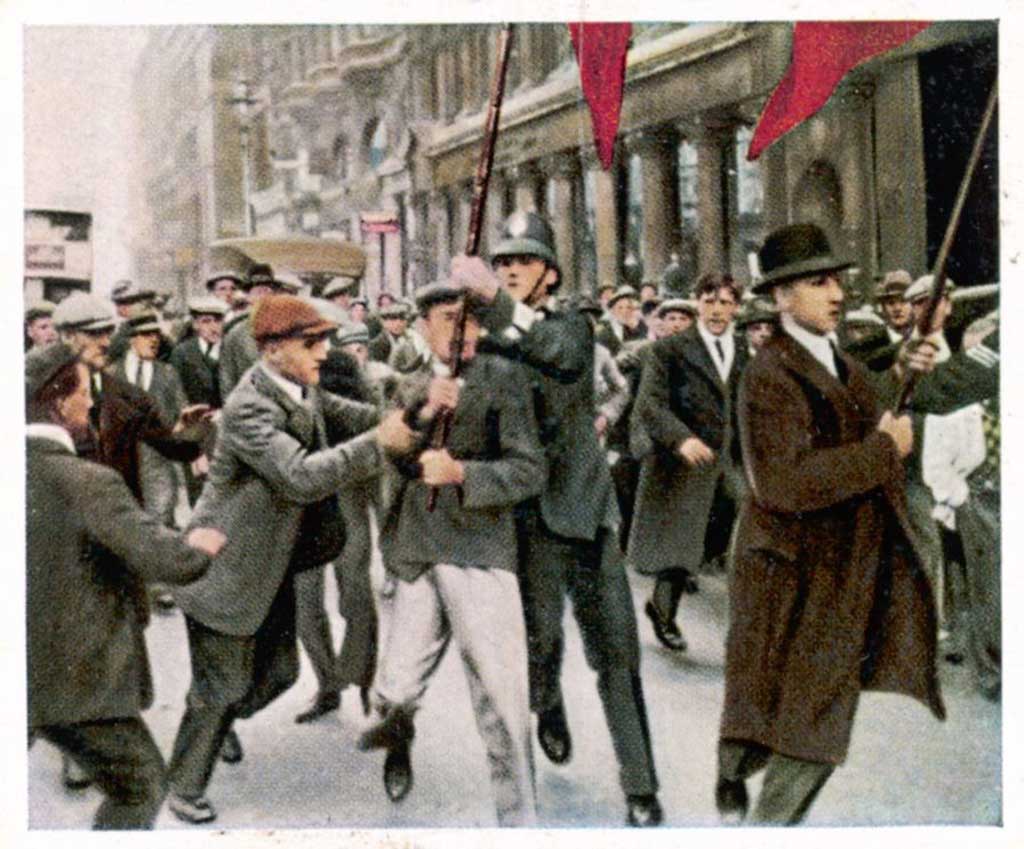The Road Not Taken: How Britain narrowly missed a revolution, By Frank McLynn
From the Peasants' Revolt to General Strike, unrest has led us to the brink – but not beyond.

Has anybody done more – done as much – as Frank McLynn in writing intelligent, combative, thoroughly researched and thoroughly readable history? His territory is very wide – from an exposé of CG Jung to a life of RL Stevenson. In his stride comes the American West and Marcus Aurelius: over 20 books so far. He has always worked very hard. Witness The Road Not Taken - 73 pages of notes for 519 pages of text. He takes seven cases of revolt in Britain between 1381 (Peasants' Revolt) and 1926 (General Strike), as cases when a transforming option vanished under the guile and stamping feet of authority.
The 1745 Jacobite rising was, he argues, a more substantial affair than supposed, with retreat from Derby not the best option for the rebels. He cites working-class support for Charles Edward Stuart in ten English towns from Newcastle to Exeter, linked with a roll-call of economic discontents, and throws in a credible link between the Jacobites and large-scale smuggling. Rightly, he stresses the economic position of many 18th-century Tories on the humane side. Samuel Johnson was no more unusual in his Tory compassion than in that faint Jacobite tendresse.
However, more is made here of Charles Edward's sympathetic social proclamations than they quite hold. The Prince, like all the Stuarts, a parasitic dynasty, depended upon foreign sponsorship. The fact that France, in the idle-minded way of Louis XV's court, let him down, did not leave him less a client. Again, McLynn does not readily acknowledge wealth-creation in its hand-in-hand dance of growth and human displacement. Economic growth is a bigger thing than any dynasty.
There is too, in other chapters, a touch of Chestertonian thinking. McLynn is not a party-line Catholic, but his views on Stuart and Tudor episodes approach the tone. Charles I is merely "weak, vacillating, autocratic, devious, duplicitous", while "the loathsome Henry VIII", savager of the Pilgrimage of Grace in 1536, would pass on "the traits of despotism, hypertrophied willpower, cunning and sheer malice" to his daughter, Elizabeth. There is more to Elizabeth than that, and how would he define the alternative, Phillip II, crouched before God in the Escorial?
Reformation iconoclasm is blamed for the lack of an English Renaissance in art, leaving us only a verbal one: Shakespeare and Milton. The Protestant Dutch got on with their painting alright. Never mind. His sympathies are radical enough to put him onside with the Levellers in the civil war, Protestants – with a dab of deism – to a man. He recognises that "The years 1646-49… constituted a revolutionary moment, a time when in principle, momentous changes were possible."
The Puritans had broken through the "credibility barrier" afflicting Wat Tyler, Jack Cade and the Pilgrims of Grace. They failed, he argues convincingly, through the eternal failings of the left, utopianism and factionalism. Yet if Lilburne, Walwyn and Overton had played a better hand, their England "would not have acquired an empire, but would have developed along the lines of Switzerland or Scandinavia". Further, they seem through honest principle and human respect to have understood Ireland, offering "partnership with a benevolent neutral, pledged never to sign up with England's enemies".
The General Strike of 1926 is the set-piece here: four chapters, 120 pages, about the flashpoint which fizzled; the defeat of an essentially defensive strike of miners by a collection of wage cuts, lost jobs, humiliation by stupid owners and an ugly government. The roots were economic: overvalued currency, an imbecile return to the gold standard, pits so long mismanaged – under-mechanised, under-productive and wholly uncompetitive with the Ruhr.
Personalities essential to the narrative appear brilliantly: Churchill paroxysmal, home secretary Joynson-Hicks recruiting Black-and-Tan types as security. For the workers, JH Thomas, the dress-suited railwaymen's leader, rejoiced in the friendship of Lord Londonderry. This battle might have ended in a revolutionary moment, but might, given calm and decent ministers, simply have been settled fairly.
Failure reflects the class chasm of 90 years ago. We are offered that encyclopaedia of condescension, the letters of Beatrice Webb. Of the miners' leader, AJ Cook, she says "He is a loosely-built, ugly-featured man – looks low-caste, not at all the skilled artisan type, more the agricultural labourer… an inspired idiot". Cook, considered an extremist and Communist, was neither. He was impassioned but, as Walter Citrine, centrist apparatchik of the TUC, remarked, "a man of absolute integrity". And someone horsewhipped at 16 by a local magnate for his opinions has a right to passion, which in Arthur Cook's runaway oratory attended a readiness for compromise.
If that goes against the grain of received judgment, so does a militarised Churchill, who appalled George V after soldiers had surrounded the docks. There was now, he proclaimed, "enough artillery assembled, to kill every living soul in every street and the troops had carte blanche to fire". McLynn uses the word "fascist" here, and why not?
However, PM Stanley Baldwin he sees only as wilfully embracing an ever-harder line from Cabinet extremists. Baldwin was, though devious, commonly devious in retreat from his better instincts. What shines out of these fascinating chapters is not necessarily a lost social transformation. The left-wing miners didn't demand one. A reasoned outcome fell before class panic and the perfect insensibility of people in authority – the king honourably excepted. No matter. Overall, we have in this quite outstanding book an arguable-with, character-rich account of longed-for ends grimly denied.
Edward Pearce's latest book is 'Pitt the Elder: man of war'
Subscribe to Independent Premium to bookmark this article
Want to bookmark your favourite articles and stories to read or reference later? Start your Independent Premium subscription today.

Join our commenting forum
Join thought-provoking conversations, follow other Independent readers and see their replies